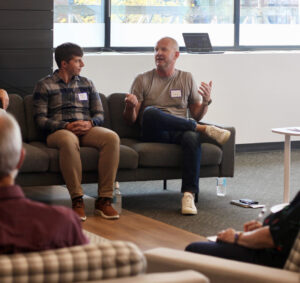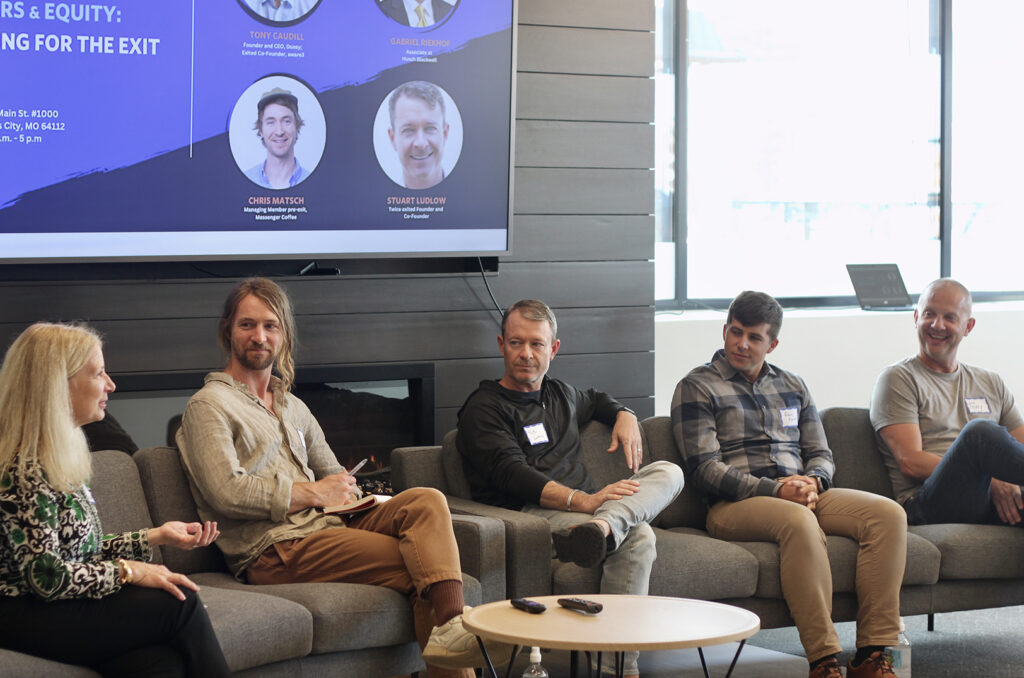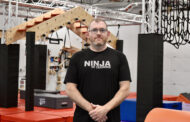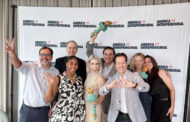Preparing for an exit begins with co-founder alignment at the startup’s launch, three veteran Kansas City founders agreed.
“You are getting married to your founders,” explained Tony Caudill, who co-founded two tech startups with his best friend — including aware3, which was acquired in 2018 by Nelnet. “Just like when you find your mate of choice, you ask them, like, ‘Do you want to have kids?’ There’s core things that you’ve got to be aligned on from the very beginning or you shouldn’t get married, right?”

Serial tech entrepreneur Tony Caudill, right, speaks alongside moderator Gabriel Riekhof, Husch Blackwell, during a Tech Venture Studio Sound Bytes session; photo by Nikki Overfelt Chifalu, Startland News
“It’s literally just that simple,” he added. “You’ve got to sit down and have that conversation with the founder before things get complicated, and just say, like, ‘What is our goal? If we get this offer, are we taking that? Are we trying to build a lifestyle business?’”
Caudill — now the co-founder and CEO of Duesy — joined fellow exited Kansas City entrepreneurs Stuart Ludlow and Chris Matsch for a recent panel conversation on equity and exit planning. The Tech Venture Studio Sound Bytes session at Husch Blackwell was moderated by Gabriel Riekhof, Husch Blackwell associate, and featured Jill Meyer, senior director of Technology Venture Studio.
It’s important for co-founders to sit down and have the tough conversations early about potentially sensitive topics like decision making and what happens if a co-founder leaves, Riekhof noted. He encouraged early-stage founders to look up operating and shareholders agreements as a starting point for those conversations.
“The team is the most important thing at founding,” Riekhof continued. “The team is the most important thing while you’re building a company. And the team is the most important thing at exit. Get that part right. Being on the same page with those team members from the beginning is the way to get there.”

Stuart Ludlow, a thrice-exited founder, speaks during a Tech Venture Studio Sound Bytes session on equity and exit planning; photo by Nikki Overfelt Chifalu, Startland News
Ludlow, who has piloted three successful exits — including RFP360, which was acquired by competitor RFPIO — key co-founder conversations fall into three core buckets: equity, who controls what decisions, and compensation.
“As you figure out those buckets with your co-founder, you hope you can be aligned in those buckets as you bring on your executives, as your equity pool changes, as your cap table changes, as board structure changes, every time you raise money,” explained Ludlow, who co-founded VeloVisa in 2023.

Jill Meyer, Technology Venture Studio, leads a panel conversation on equity and exit planning at Husch Blackwell; photo by Nikki Overfelt Chifalu, Startland News
Matsch — a co-founder of Messenger and Ibis Bakery, which was acquired by FairWave Holdings in 2020 — said he found out the hard way that those early talks among co-founders are essential. Messenger’s exit to FairWave was complicated and lengthy because there was no clear operating agreement and no clear structure to the business, which involved seven founders — and three additional partners who joined the venture about five years in — and multiple businesses.
“The later it got, the more difficult it was to have those conversations,” added Matsch, also the co-founder of North Bluff Cider and Marion Milling Company. “We made so many mistakes. But I think the cool thing about all three of our stories is that they all worked out well for us in the end, although obviously that doesn’t alway happen.”




































